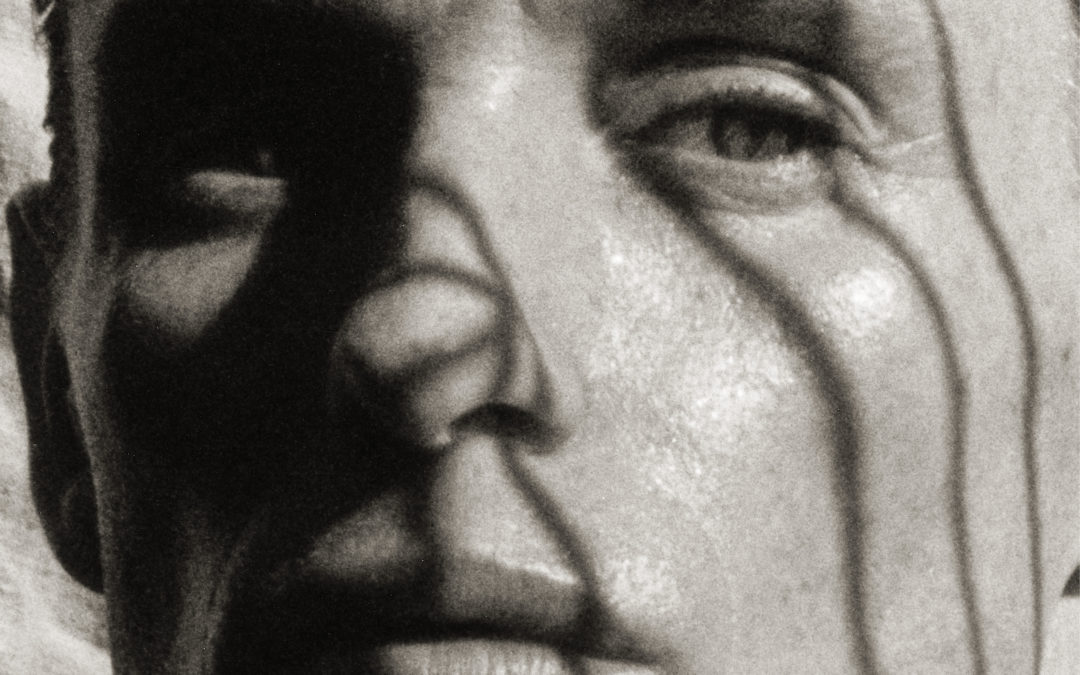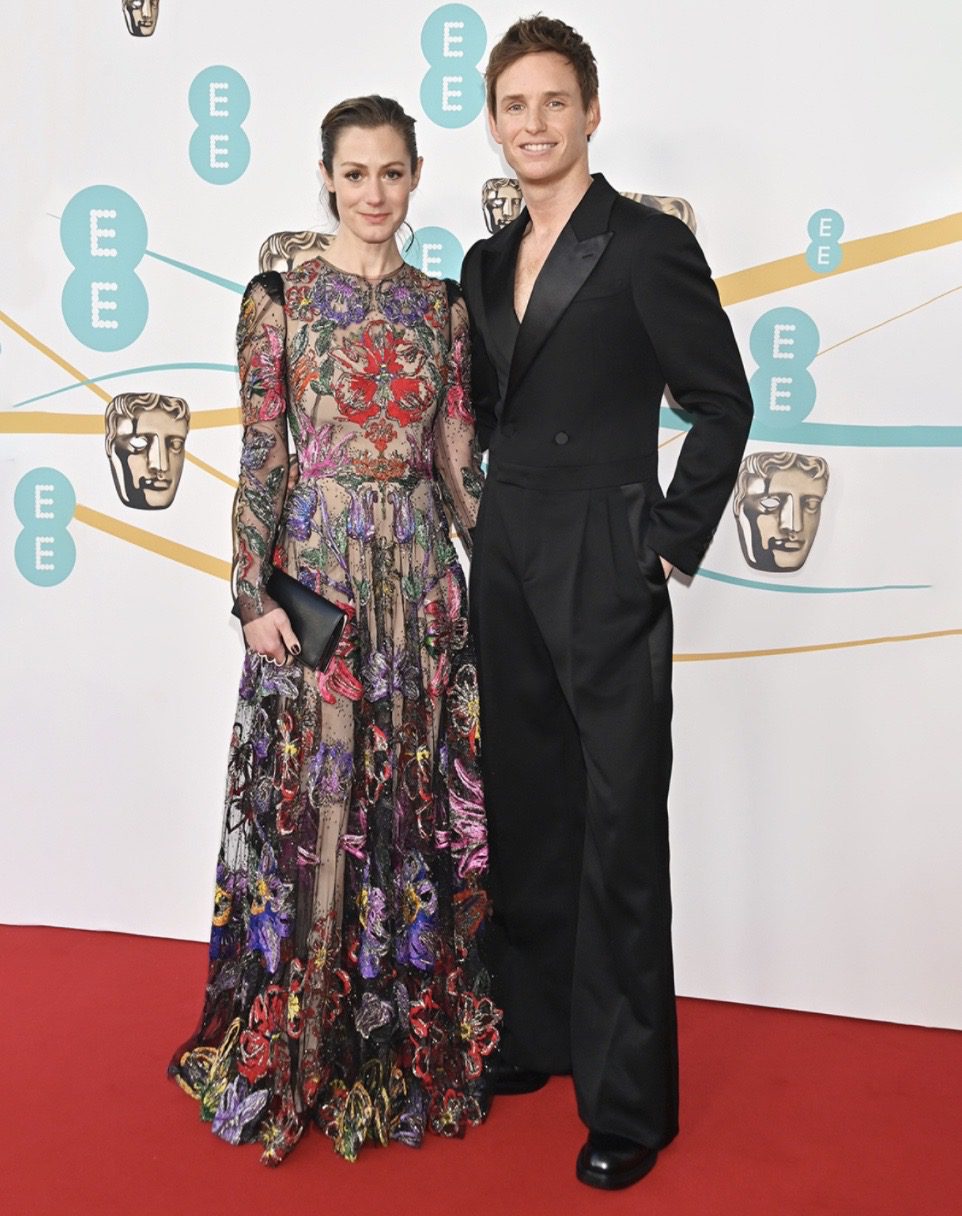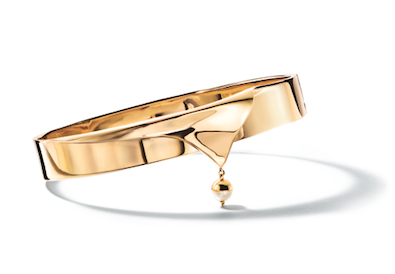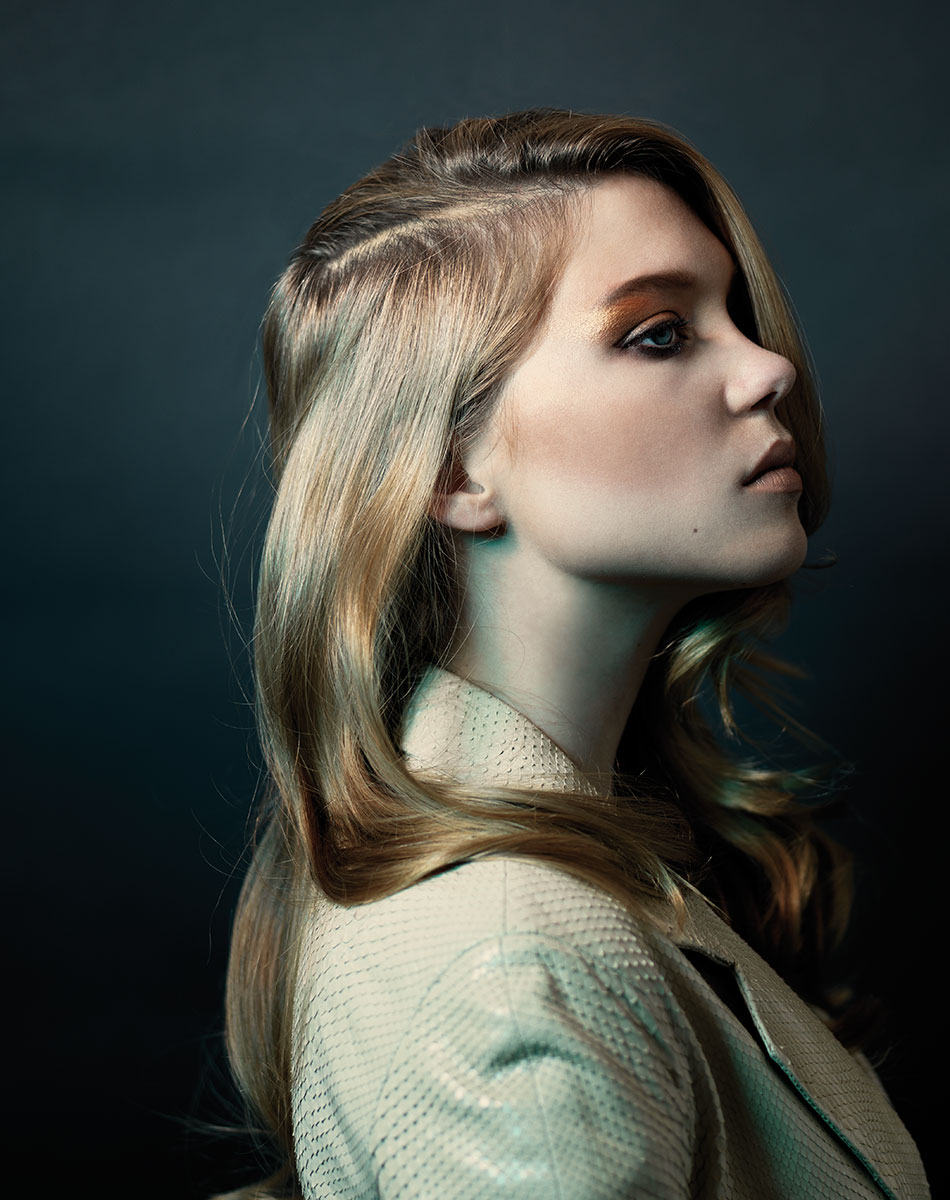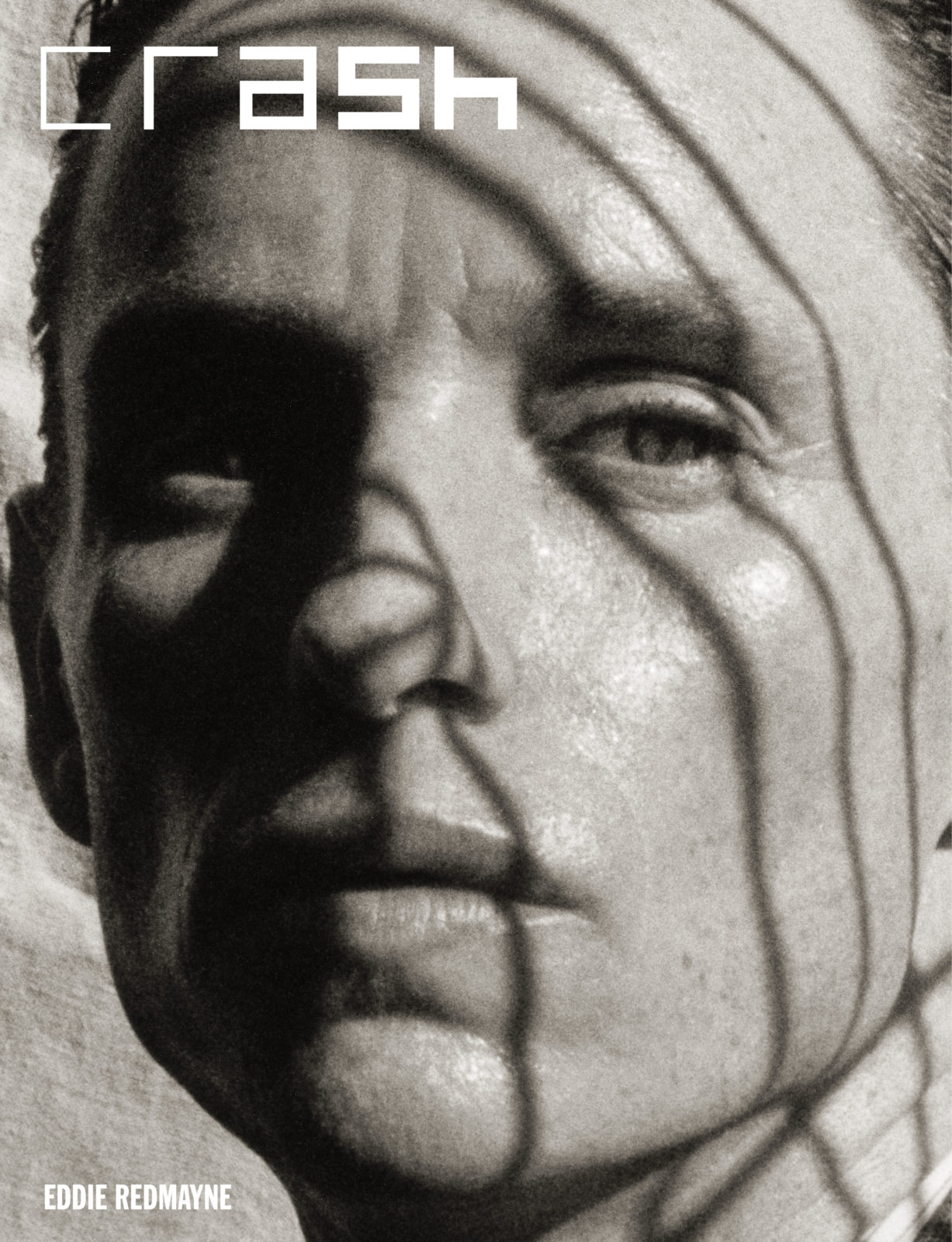
Photos by Laura Marie Cieplik
AN INTERVIEW WITH EDDIE REDMAYNE
By Jessica Williams
Discover the interview, digital cover, and exclusive first images from our fashion story, shot in London with the Oscar-winning British actor, Eddie Redmayne, fresh off the heels of his “Best Actor in a Musical” win at The 2022 Olivier Awards for his performance in “Cabaret”. Interviewed for Crash by co-star and friend, American actress, Jessica Williams, at the dawn of the release of “Fantastic Beasts: The Secrets of Dumbledore,” the pair discussed their shared love of classic English interior design and slow-poured coffee, “Fantastic Beasts,” and gave us a glimpse into the industry on both sides of the Atlantic.
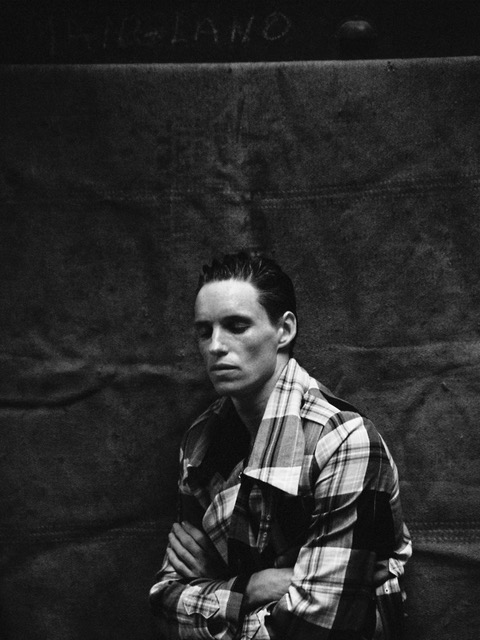
Check trench coat – Charles Jeffrey Loverboy
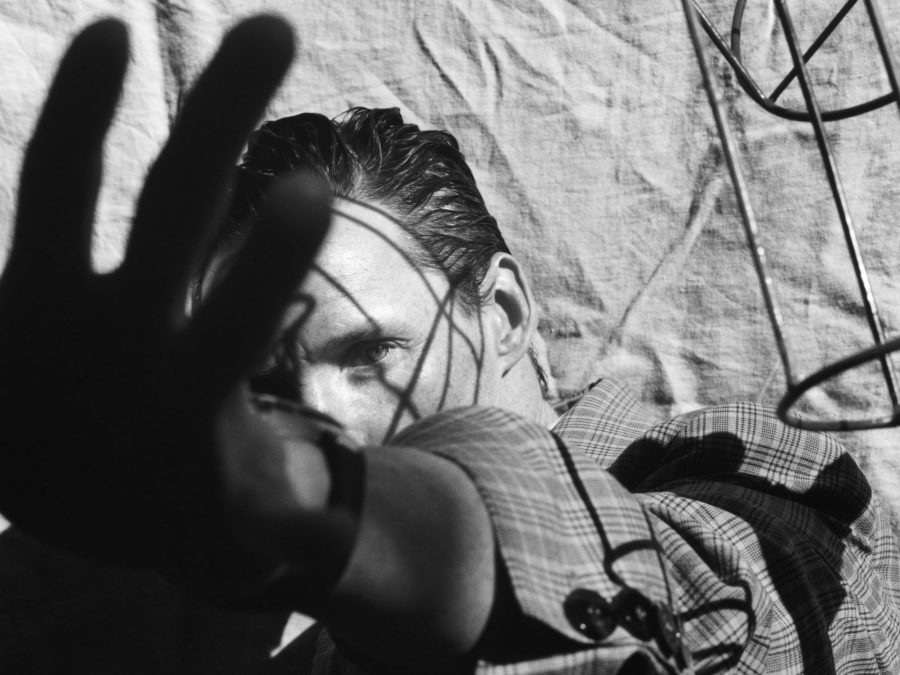
Check double breasted blazer, pin stripe short sleeve shirt – Ernest W. Baker
‘Constellation 41mm’, steel – Sedna gold, burgundy leather strap, burgundy gradient dial watch – Omega
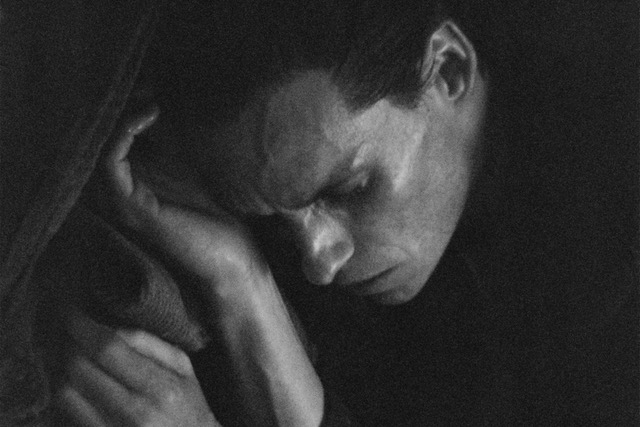
Wool double-breasted jacket Prince of Wales mottled – Dior Men
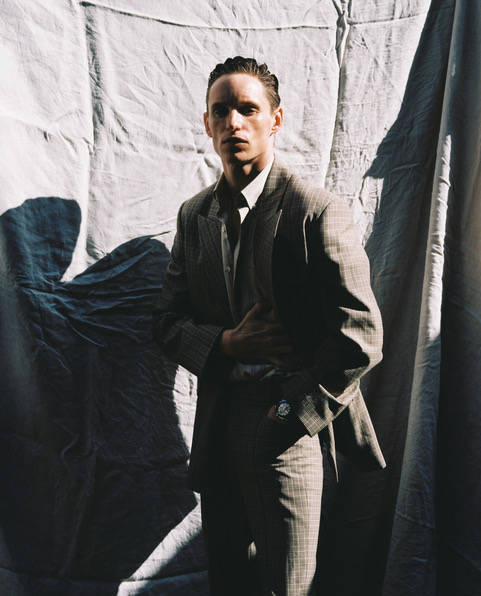
Check double breasted blazer and flare trousers, pin stripe short sleeve shirt – Ernest W. Baker
‘Constellation 41mm’, steel – Sedna gold, burgundy leather strap, burgundy gradient dial watch – Omega
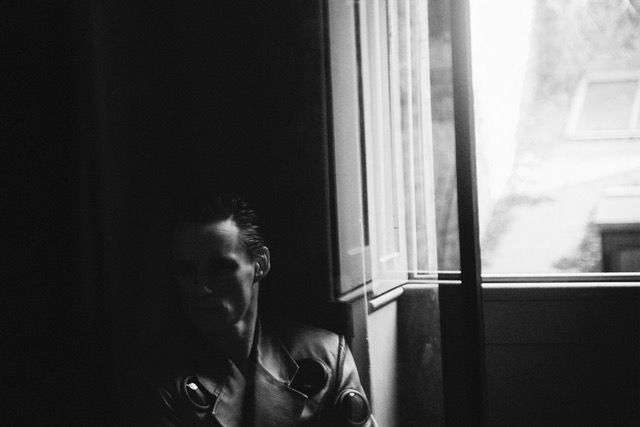
Irregular stereoscopic piercing suit jacket – Pronounce
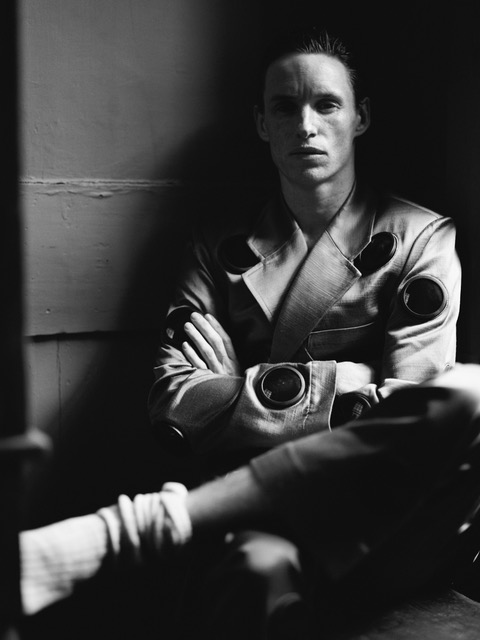
Irregular stereoscopic piercing suit jacket and slim flared ankle length pants – Pronounce
Cashmere ribbed socks with gothic ‘CD’ embroidery – Dior Men
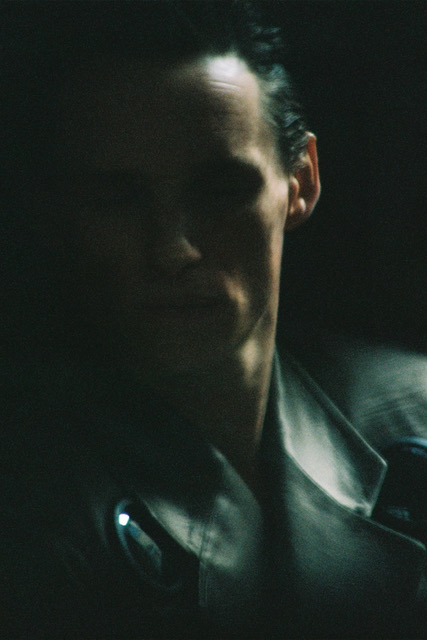
Irregular stereoscopic piercing suit jacket – Pronounce
ER – We had quite a lot of fun filming “Fantastic Beasts” didn’t we? The joy of these films, I hope you found also, is getting to work with a bunch of beautifully talented, kind-hearted people, in which one is allowed to let your imagination run, I pinch myself everyday about that.
JW – Yes, for sure, I’m really excited for this interview, I think it’s going to be great and we’re going to get to see a side of you that we haven’t seen before. You look very nice today in your black turtleneck.
ER – I’m channeling an English “thesp” (laughing), all in black, in a turtleneck, imagining that I’m playing Hamlet, although I’ve never played Hamlet before, and I have no intention of ever playing Hamlet.
JW – Why don’t you want to play Hamlet?
ER – Because amongst English actors, there’s a canon of parts that you’re meant to play and I always felt that I’d rather play the slightly more random roles. I did play Richard II around ten years ago though and I think as a British actor when you play famous Shakespeare parts, every extraordinary actor before you has already played them and I don’t love being in that litany of people to be compared to, I’d rather do parts that people haven’t played before. Although I thought that when I got the role in “Cabaret », and then I remembered that Joel Grey and Alan Cumming did “Cabaret” actually quite well before! (Laughing)
JW – You were amazing in “Cabaret », did you have fun doing it?
ER – You have a way about you that I’m never quite sure whether you’re being honest or just saying something because you have to.(Laughing) I’ve seen your interviews before, particularly from back in the day with Colbert, and some of the interviews you did at far-right rallies. You are able to pull a really honest face whilst allowing people to skewer themselves with their own absurd words. So seeing your face whilst you are interviewing me makes me feel like I’m skewering myself! (Laughs)
JW – No! I would never do anything to skewer you, except I will ask you where my wrap-gift is? And don’t just hand me something from the hotel room, that’s not going to count.
ER – Well, seen as though you and I share a weird love of a specific type of English house, and one of your favorite designers is Kit Kemp…
JW – Okay, so you just handed me a random Kit Kemp book from the random Kit Kemp hotel that we’re staying in. This is not something that belongs to you, nor is it something for you to give away, but I appreciate the symbolism of it, thank you so much.
ER – You were so thoughtful in giving us all wrap gifts at the end of “Fantastic Beasts”.
JW – The only notable people that didn’t were you and Callum Turner (Theseus Scamander – Fantastic Beasts). But you did leave me an incredibly lovely three-minute voice message saying how much you enjoyed working with me, which I thought was very thoughtful so I appreciate that.
ER – Thoughtful, rather than a material gift…
JW – Well sometimes materials matter. (Laughing) Of course that was appreciated, but I am a Leo! What’s your sign?
ER – I’m a Capricorn.
JW – That makes sense.
ER – But really, does it? I’ve never really understood what any of it means.
JW – It does, you work really hard, you change really quickly to leave work, you’re not the person who will hang around and get after-work drinks.
ER – Is that what Capricorns do? Sorry, is there somewhere in the signs that says that Capricorn actors get out of costume really quickly and go home, is that in the stars? (Laughing)
JW – (Laughs) Definitely! For example, when I went to see you in “Cabaret », I spent a few minutes enjoying the surroundings and then I came to say thank you for having us and you were already leaving to go home and tuck your kids in.
ER – I mean the truth with “Cabaret” was that I had to go home to sleep, in order to be able to do it again twice the next day, but I was so excited to see you guys. I’d actually prepared my dressing room for your visit!
JW – That’s hysterical. What does that look like then?
ER – I got drinks ready for you, but then, I legged it! (Laughing)
JW – I like that about you though, you’re good about being home to tuck in your kids, it’s really cool.
ER – In all seriousness, the acting world has such a weird life rhythm that constantly shifts. When it comes to my family, I personally had quite a stable upbringing and I’m endlessly trying to find some stability for my kids. My wife and I find that we basically have no control, particularly when I’m doing theater work. I haven’t done a play since Hannah and I got together, and the reality of it is that every night other than Sunday, you’re out working. You have to sleep late in the mornings so you don’t get to see your kids and you’re also living like a monk! You’re not able to drink and you have to be strict with yourself. It’s quite intense to put my wife and kids through that, so I was trying to be quite good at going home when I could.
JW – Sometimes I worry about that as a thirty-two-year-old actor. There’s a weird trajectory where, the more successful you are, the less time you spend at home, and I found that it’s really hard for me to not be at home much. I like being home! It’s really encouraging when I meet actors that are slightly older who have a bit more of a homelife and who actively try to make sure that there’s some stability in their home.
ER – When I was in New York for a play around twelve years ago, part of the fun was friends coming to see it and getting a chance to connect with some people I hadn’t seen since college, it was all about the social element afterwards. But this time, particularly with it being a musical, it was important to protect my voice, which sounds silly but it is important. As you get older you also realize that, even though you have that adrenaline at the end of a show and you want to go out with your mates, you have to be more monastic for the sake of your performance, and your priorities change. In many ways acting is, in its very nature, selfish.
JW – It is, you have to have the audacity to demand that people look at whilst you tell your stories. Everybody has to adjust themselves around you, especially at home and in your personal life. They have to adjust to you being gone also.
ER – Completely, and also you have to commit yourself to the process, whatever it takes. It’s impossible to calcify whatever that process is, but you have to do it. For example with “Cabaret”, I had to get in really early, because I’m old and I was dancing a shit load! I had to stretch for half the afternoon! (Laughing) But also, it’s a bit like being an athlete, even though you’re not doing it until the evening, your head space is there from the early morning, so you’re not necessarily entirely present when you are at home. Now that I’m done with that play, I want to go fully back into just being a dad and a husband.
JW – Completely, you mentioned you went back to school in between filming “Fantastic Beasts” and your performance in “Cabaret”, was that in preparation for being back on stage?
ER – In a way. For years, I would audition for many roles, and if I got the job then I would do it. Then “The Theory of Everything” changed all that and suddenly I was offered scripts without auditioning, and I would have the power to get films greenlit. But what comes with that is that sometimes directors no longer “direct you”. They expect you to just be yourself, but you can’t grow as an actor like that and you still want to be challenged. At the end of last year I was beginning to lose my passion for it all, and finding myself reliant on old ticks and tricks. I then worked with a Danish director called Tobias Lindholm (on “The Good Nurse”) who challenged me in all those brilliant ways, and it reignited something in me. When I finished filming with him in New York, I felt a renewed passion and I knew that for “Cabaret”, there was something “Pierrot-like” or “clown-like” that was intriguing to me and I wanted the character to be shape shifting. When I was at university, I knew a lot of actors who had gone to Lecoq (École internationale de théâtre Jacques Lecoq), which is a physical theater-based drama school in Paris. He (Jacques Lecoq) was a great practitioner so I just looked it up online and they had some great courses for people in the profession. There was one called “Theater of the Absurd », which I found really intriguing so I applied, sent my CV and went to Paris to live there for a few weeks. It was amazing because it was like going to school again. It was with a group of people from all around the world from age eighteen up to people in their sixties, in an extraordinary space that was steeped in history. It was in an old boxing ring in Paris which was almost like a gymnasium. The teachers were these two doyens, one of whom had worked with Lecoq, and they instantly started playing and interacting with you, and telling you how it is. The interesting thing about “The Theater of the Absurd”, was the idea of something being rooted in absolute truth, but there being a heightened element to it too. You are extraordinary at improvisation, but I don’t have a natural vicinity for it, but watching other people improvise and being forced to do it yourself in front of a group of people was pretty exposing, but also thrilling at the same time. It was very much what I needed at the time. They were so honest to everyone. I don’t know whether I took any of the specifics from it back to “Cabaret”, but I definitely took the experience. I had basically just wanted to fuck myself up a bit.
JW – It’s good to shake things up. Do you feel like you always learn from every character that you play, and what do you take away from them?
ER – I do always find that I learn something, but I never know what that’s going to be. It could either be to do with the work itself, or it could be to do with behavior, for example how not to behave on a film set, or sometimes I find I learn a life lesson. On “Cabaret” for example, our choreographer was an amazing woman called Julia Cheng. We would come to rehearsals everyday, and she would ask everyone to stand in a circle and check in with one another about how we were all feeling emotionally that day, I’d never done anything like it before. People could be very honest in a way that would make me feel super fucking British and awkward, but they could admit that perhaps they’d had a problem at home, broken up with their partner or had a difficult morning for whatever reason. One of the things I loathe about the old hierarchy of film sets, is that someone can turn up on and bring with them a “froideur”. They might just have a chill in them that makes you feel like you have to avoid them and it can bring an entire energy down and feed into the set. The process that Julia did was to allow anyone that was feeling rough to vocalize it and it meant then that we lent into helping that person, but you never had that experience of someone infiltrating or lowering the temperature of an entire room. Instead everyone would actually rally round that person and use the process to push through whatever those hurdles were.
JW – That’s interesting, the idea of being an actor is that we’re often not allowed to have our own emotions. When you are auditioning a lot there is often a lot of rejection that comes with that, but you always have to be ready to do the show. It’s an interesting idea that you’re allowed to acknowledge how you’re feeling for the day and you’re allowed to be sad.
ER – Sometimes historically, you were made to feel like you should use all those emotions and perhaps it’s helpful for some people, but I’m discovering more and more that I’m not that sort of actor. If I’m working with you and I can feel that you’re in a fury, you might be a brilliant enough actor to be able to turn it on to a point, but I can’t. It bothers me and it gets in my head, so I can’t actually be totally present with you. So generally on film sets I have to make sure that I get on with everyone and I spend quite a lot of energy trying to make sure that everyone is fine. But there are selfish motivations behind it because it’s so that I can do my job well, it’s not like I’m completely selfless.
JW – I have worked a lot with actors like that, they’re the rockstars of the acting world in a way and they have their own process and they almost don’t care about others. They have a very “take me as I am” attitude and you’re right, you’re not at all that kind of actor.
ER – I do think it’s changing though. When I first started acting I worked with a couple of actors whose behavior on set was so dumbfounding and they poisoned the whole thing. Yet you watched their performance in the end product and they were extraordinary but no one else around them was, because their behavior had drained everyone else so much.
JW – It can be so intimidating. What I appreciated on the set of “Fantastic Beasts” was how nice you were to me and also being able to watch you work so close up. It was really cool to see the way you and Jude worked. The fact that you are both English actors is just so different to me, and that you’ve both won BAFTAs!
ER – You mentioned the other day about the English being different, what do you mean by that?
JW – Coming from the States you often have a different route into acting. I didn’t go to drama school personally and whilst there’s a lot of people that do, it is still a very different education. I didn’t know about the set roles that all actors that come from the UK seem to play at some point, it’s like you have your own shorthand. Hearing how you all came into the business from the London scene and you all seem to know a lot of the same people, and it was interesting to see you interact on set. You carry yourself in a particular way and you just have all these interesting stories. I think the fact that you went to boarding school growing up makes you a particular kind of person and informs the way you carry yourself. I don’t know too many people that went to boarding school because in the States, particularly on the West Coast it’s not as big of a thing.
ER – (Laughing) It’s like I went to Hogwarts basically! I think that in the UK the general route is to go to a drama school, and then you might get a bit of a break and be spotted by an agent and you move into theater, where casting directors come and see you play, and then you might get scouted for TV or cinema. I’ve heard that in America, you can start as a kid actor in commercials and go straight into TV or film and you’re not required to spend time working in the theater before.I didn’t actually go to drama school, but I was in a lot of plays whilst I was studying.
JW – Who are your favorite actors, is there anyone in particular who inspired you to get into acting?
ER – It shifts and changes over the years, but it tends to be more performance related. Recently the performances that have blown my mind are Michaela Coel in “I May Destroy You”, Josh O’Connor in “God’s Own Country”, on the flight over here I watched “The Bridges of Madison County” and thought it was brilliant, Meryl Streep’s performance is dumbfounding.
JW – She is amazing. What do you look for when you are watching a performance?
ER – What I’m really looking for is an absolute effortlessness, something authentic that doesn’t feel forced in any way. On stage, the best performance I’ve ever seen was by Billie Piper in “Yerma”. It’s one of those performances where, although you know the actor is doing it every night, you want to go and just hug them and check they’re ok afterwards, which is interestingly how I felt when I was working on “Cabaret” with Jessie Buckley, and also like like Jeremy Strong in “Succession”. For me it’s all about those performances where you can’t see the machinations and the technique behind them. There’s something so unofficial about film sets, fundamentally there are crews of people and tons of technical equipment in front of you, and then another actor, and you have to imagine that none of that’s there. For me, as a colour blind person with shoddy peripheral vision, the way the cinematographer worked on the set of “The Good Nurse” was riveting. It was super dark, so when you were opposite your co-star each you could barely see one another’s eyes, and yet the apertures were so open that when you saw it on playback it looked like normal lighting. But it meant that you were shooting virtually every scene practically in darkness and I found it so thrilling. It did half the work of blacking out and pushing back the presence of other people, and so brought it closer to reality which I found really freeing. Part of the work I usually find most complex on film sets is using that part of your imagination to remove all the falseness that’s in front of you.
JW – When you close your eyes on set in that way do you meditate?
ER – I have tried to meditate. I’ve done those apps, but I find the voice just gets annoying, it’s very irritating and smug! (Laughs)
JW – Well, when you close your eyes and you imagine you’re in a safe place, what is it to you?
ER – My answer is very telling of me as a person actually. It’s a moment on a tropical white sandy beach, instantly followed by a voice saying “Eddie, look at your skin, put some sunscreen on!” (Laughing) Whenever I’m out in the sun moles appear and my skin just gets so damaged.
JW – That’s hysterical! Do you travel a lot? What do you and Hannah (your wife) like to do in your spare time?
ER – Both of us are into art so we go to galleries quite a lot, and we do like to travel a lot yes. She is obsessed with horse riding but I almost killed myself once on a film set having lied about my ability to ride but she still tries to get me into it. I was doing it just before I started “Cabaret” and then I got thrown off again, so I thought for the sake of the production and my own health, that I should probably steer clear. We also like watching cooking shows, when I’m working on a film, I can’t watch other movies because my head goes into a critical place so I either watch really trashy television or cookery programs.
JW – Oh yeah, you know I’m obsessed with reality shows and “Real Housewives” and that’s one of the reasons that I like it, is that I don’t go into that critical hole.
ER – I know you are. I think one of the first conversations we had, you did get critical about it and you could actually write a proper thesis on the psychology behind it.
JW – I am obsessed with it so thank you.
ER – Have you written a thesis before?
JW – No, I didn’t finish school actually, I left college to go to “The Daily Show”.
ER – How did you get scouted for that?
JW – I just auditioned, I was doing improv and sketches in LA. The casting director was Allison Jones, she had always liked me and she just had a hunch that I should do it, and she got me on board. I did it for about five years, I was twenty-two at the time and Jon Stewart just bagged on raw talent, which was nice.
ER – I love Jon Stewart, he’s the best. Normally when you are invited on to American talk shows, you always have a “pre-interview”, and they want you to just tell funny stories that you haven’t talked about previously on other shows, but I’ve run out of material! “The Jon Stewart Show” is more like an actual interview rather than being slightly like a performing monkey.
JW – Absolutely, that is what it’s about on there. A more personal question I have is, how are you able to have coffee at night after dinner?
ER – I am getting worse at that! But this is a French magazine and the Parisians do it all the time so I’ll admit that I just love coffee, I do have a slight addiction to it. During lockdown coffee was one of the things that I started to take time over, when we all started to adopt this idea of slowing down. Taking my time with coffee and really enjoying how it feels to pour, what it looks like, and then really taking a moment with the smell. I’m someone that just rushes through life, so that’s been my equivalent of one of those meditation apps for me actually.
ER It’s like the film “Another Round” with Mads Mikkelsen (who plays Gellert Grindelwald, Fantastic Beasts) The idea behind it is that there’s a level of drunkenness in which you can get to in which all human beings are their optimum selves, and the film pushes and investigates that. I wonder if there’s like a caffeinated version of that, a specific amount of coffee that actually makes us the best version of ourselves. (Laughs).
JW – Maybe! I got into coffee during the pandemic. Before I just used to only have tea, and my life is now definitely a bit worse, because now I have coffee all the time. I wonder why I did that to myself, but I just love the ritual of it. Another personal question then, what qualities do you like in your friends?
ER – To be brutally honest, it’s because I tend to find them quite funny! Humor is important to me because I’m not a particularly funny person, or outwardly so anyway, so when you find someone where you connect on what that is specifically, it’s so interesting, almost subliminal.
JW – That’s right you can hang out with professional comedians who aren’t able to make you laugh in the same way that your close friends can.
ER – It’s the brutal honesty you have with one another when you’re hungover that I love. Sometimes, I’m the best version of myself when I’m hungover and my filter just disappears! Kindness is important in friends too, because I really think the world is just too full of mean people. And the last thing would be passion, I think that provided one has passion, caveat for those passions being about horrendous things, it’s always an attractive thing, the more random the passion, almost the more attractive it is.
JW – Do you know what kind of dad you want to be and are you ever afraid of being a dad?
ER – What’s interesting about being a dad is that you can have opinions on what sort of parent you want to be and then when you’re in the thick of it, it’s quick fire, and you’re just able to respond as best your instincts allow! You might think you’re going to be “one of those dads” but the reality is that you don’t even have time to think. (Laughing)
JW – What kind of dad did you fantasize that you would be then?
ER – It’s hard to say, but here’s an example: my children, Luke and Iris, have been asking me recently if I’m a real wizard. I’m torn between not wanting to lie to them, but also between wanting them to think I’m cool. So I eventually ended up telling them that I was a wizard, and now they keep on asking me to do the magic tricks that I do in the trailer for “Fantastic Beasts”, which is obviously slightly difficult considering the only magic trick I know is how to make a coin disappear. Am I now a disappointment or are they going to tell their friends that their dad’s a wizard, and ultimately then get bullied when they find out that their dad’s not a wizard?
JW – So you’re just kind of responding to things as they happen!
ER – Yes all we can do in life is respond!
JW – That’s right! (Laughing) Well thank you so much for answering my questions!
ER – Thanks to you!
Photographer Laura Marie Cieplik
Creative Director Kaduri Elyashar
Stylist Armelle Leturcq
Hair and Makeup Petra Sellge at The Wall Group Stylist
Assistants Roisin Breen and Nancy Ngobese






